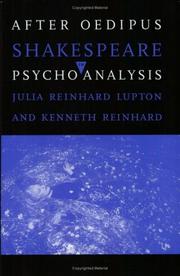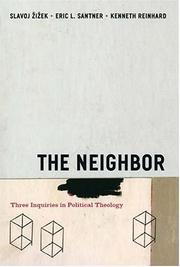| Listing 1 - 10 of 23 | << page >> |
Sort by
|
Digital
ISBN: 9780231527736 9780231157759 Year: 2013 Publisher: New York, N.Y. Columbia University Press
Abstract | Keywords | Export | Availability | Bookmark
 Loading...
Loading...Choose an application
- Reference Manager
- EndNote
- RefWorks (Direct export to RefWorks)

ISBN: 080149687X Year: 1993 Publisher: Ithaca (N.Y.) : Cornell university press,
Abstract | Keywords | Export | Availability | Bookmark
 Loading...
Loading...Choose an application
- Reference Manager
- EndNote
- RefWorks (Direct export to RefWorks)
Book
ISBN: 1888570350 1935790455 Year: 2006 Publisher: The Davies Group, Publishers
Abstract | Keywords | Export | Availability | Bookmark
 Loading...
Loading...Choose an application
- Reference Manager
- EndNote
- RefWorks (Direct export to RefWorks)

ISBN: 0801424070 Year: 1993 Publisher: Ithaca Cornell University Press
Abstract | Keywords | Export | Availability | Bookmark
 Loading...
Loading...Choose an application
- Reference Manager
- EndNote
- RefWorks (Direct export to RefWorks)

ISBN: 0226707385 0226707393 9780226707389 9780226707396 Year: 2005 Publisher: Chicago: University of Chicago press,
Abstract | Keywords | Export | Availability | Bookmark
 Loading...
Loading...Choose an application
- Reference Manager
- EndNote
- RefWorks (Direct export to RefWorks)
Political theology. --- Church and social problems. --- Church and social problems --- Political theology --- 811 Filosofie --- Theology, Doctrinal --- Public theology --- Christianity and social problems --- Social problems and Christianity --- Social problems and the church --- Social problems
Book
ISBN: 9780231548410 0231548419 9780231171489 023117148X Year: 2019 Publisher: New York, NY : Columbia University Press,
Abstract | Keywords | Export | Availability | Bookmark
 Loading...
Loading...Choose an application
- Reference Manager
- EndNote
- RefWorks (Direct export to RefWorks)
Alain Badiou is arguably the most significant philosopher in Europe today. Badiou's seminars, given annually on major conceptual and historical topics, constitute an enormously important part of his work. They served as laboratories for his thought and public illuminations of his complex ideas yet remain little known. This book, the transcript of Badiou's year-long seminar on the psychoanalytic theory of Jacques Lacan, is the first volume of his seminars to be published in English, opening up a new and vital aspect of his thinking.In a highly original and compelling account of Lacan's theory and therapeutic practice, Badiou considers the challenge that Lacan poses to fundamental philosophical topics such as being, the subject, and truth. Badiou argues that Lacan is a singular figure of the "anti-philosopher," a series of thinkers stretching back to Saint Paul and including Kierkegaard and Nietzsche, with Lacan as the last great anti-philosopher of modernity. The book offers a forceful reading of an enigmatic yet foundational thinker and sheds light on the crucial role that Lacan plays in Badiou's own thought. This seminar, more accessible than some of Badiou's more difficult works, will be profoundly valuable for the many readers across academic disciplines, art and literature, and political activism who find his thought essential.
Psychoanalysis. --- Psychology --- Psychology, Pathological --- Lacan, Jacques, --- Lacan, Jacques
Book
ISBN: 023152773X 9780231527736 9780231157742 0231157746 9780231157759 0231157754 Year: 2013 Publisher: New York, NY : Columbia University Press,
Abstract | Keywords | Export | Availability | Bookmark
 Loading...
Loading...Choose an application
- Reference Manager
- EndNote
- RefWorks (Direct export to RefWorks)
The Incident at Antioch is a key play marking Alain Badiou's transition from classical Marxism to a "politics of subtraction" far removed from party and state. Written with striking eloquence and extraordinary poetic richness, and shifting from highly serious emotional and intellectual drama to surreal comic interlude, the work features statesmen, workers, and revolutionaries struggling to reconcile the nature and practice of politics.This bilingual edition presents L'Incident d'Antioche in its original French and, on facing pages, an expertly executed English translation. Badiou adds a special preface, and an introduction by the scholar Kenneth Reinhard connects the play to Paul Claudel's The City, Saint Paul and the early history of the Church, and the innovative mathematical thinking of Paul Cohen. The translation includes Susan Spitzer's extensive notes clarifying allusions and "ations and hinting at Badiou's intentions. An interview with Badiou encompasses the play's settings, themes, and events, as well as his ongoing literary and conceptual experimentation on stage and off.
Book
ISBN: 9780231548533 0231548532 9780231174787 0231174780 Year: 2019 Publisher: New York, NY : Columbia University Press,
Abstract | Keywords | Export | Availability | Bookmark
 Loading...
Loading...Choose an application
- Reference Manager
- EndNote
- RefWorks (Direct export to RefWorks)
Alain Badiou is perhaps the world's most significant living philosopher. In his annual seminars on major topics and pivotal figures, Badiou developed vital aspects of his thinking on a range of subjects that he would go on to explore in his influential works. In this seminar, Badiou offers a tour de force encounter with a lesser-known seventeenth-century philosopher and theologian, Nicolas Malebranche, a contemporary and peer of Spinoza and Leibniz.The seminar is at once a record of Badiou's thought at a key moment in the years before the publication of his most important work, Being and Event, and a lively interrogation of Malebranche's key text, the Treatise on Nature and Grace. Badiou develops a rigorous yet novel analysis of Malebranche's theory of grace, retracing his claims regarding the nature of creation and the relation between God and world and between God and Jesus. Through Malebranche, Badiou develops a radical concept of truth and the subject. This book renders a seemingly obscure post-Cartesian philosopher fascinating and alive, restoring him to the philosophy canon. It occupies a pivotal place in Badiou's reflections on the nature of being that demonstrates the crucial role of theology in his thinking.
Book
ISBN: 9780231500654 0231500653 Year: 2013 Publisher: New York, NY : Columbia University Press,
Abstract | Keywords | Export | Availability | Bookmark
 Loading...
Loading...Choose an application
- Reference Manager
- EndNote
- RefWorks (Direct export to RefWorks)
Plato's Republic is one of the best-known and most widely-discussed texts in the history of philosophy. But how might we get to the heart of this work today, 2,500 years after its original composition? Alain Badiou breathes life into Plato's landmark text and revives its universality. Rather than producing yet another critical commentary, he has instead worked closely on the original Greek and, through spectacular changes, adapted it to our times. In this innovative reimagining of Plato's work, Badiou has removed all references specific to ancient Greek society—from lengthy exchanges about moral courage in archaic poetry to political considerations mainly of interest to the aristocratic elite—and has expanded the range of cultural references. Here, philosophy is firing on all cylinders: Socrates and his companions are joined by Beckett, Pessoa, Freud, and Hegel, among others. Together these thinkers demonstrate that true philosophy endures, ready to absorb new horizons without changing its essence.Moreover, Badiou—who is also a dramatist—has transformed the Socratic dialogue into a genuine oratorial contest. In his version of the Republic, the interlocutors do much more than simply agree with Socrates. They argue, stand up to him, put him on the spot, and show thought in motion. In this work of dramatic scholarship and philosophy, we encounter a modern version of Plato's text that is alive, stimulating, and directly relevant to our own world.
Autobiography --- Women --- Aging --- Feminist literary criticism --- History and criticism --- Biography. --- Psychological aspects. --- Plato.
Book
ISBN: 022606851X 1299691161 9781299691162 9780226068510 9780226045207 022604520X Year: 2013 Publisher: Chicago ; London : University of Chicago Press,
Abstract | Keywords | Export | Availability | Bookmark
 Loading...
Loading...Choose an application
- Reference Manager
- EndNote
- RefWorks (Direct export to RefWorks)
In Civilization and Its Discontents, Freud made abundantly clear what he thought about the biblical injunction, first articulated in Leviticus 19:18 and then elaborated in Christian teachings, to love one's neighbor as oneself. "Let us adopt a naive attitude towards it," he proposed, "as though we were hearing it for the first time; we shall be unable then to suppress a feeling of surprise and bewilderment." After the horrors of World War II, the Holocaust, and Stalinism, Leviticus 19:18 seems even less conceivable-but all the more urgent now-than Freud imagined. In The Neighbor, three of the most significant intellectuals working in psychoanalysis and critical theory collaborate to show how this problem of neighbor-love opens questions that are fundamental to ethical inquiry and that suggest a new theological configuration of political theory. Their three extended essays explore today's central historical problem: the persistence of the theological in the political. In "Toward a Political Theology of the Neighbor," Kenneth Reinhard supplements Carl Schmitt's political theology of the enemy and friend with a political theology of the neighbor based in psychoanalysis. In "Miracles Happen," Eric L. Santner extends the book's exploration of neighbor-love through a bracing reassessment of Benjamin and Rosenzweig. And in an impassioned plea for ethical violence, Slavoj Žižek's "Neighbors and Other Monsters" reconsiders the idea of excess to rehabilitate a positive sense of the inhuman and challenge the influence of Levinas on contemporary ethical thought. A rich and suggestive account of the interplay between love and hate, self and other, personal and political, The Neighbor has proven to be a touchstone across the humanities and a crucial text for understanding the persistence of political theology in secular modernity. This new edition contains a new preface by the authors.
Political theology. --- Church and social problems. --- critical theory, psychoanalysis, neighbor, politics, community, love, ethics, philosophy, carl schmitt, enemy, friend, rosenzweig, benjamin, slavoj zizek, violence, inhuman, levinas, leviticus, hate, self, other, materiality, sovereignty, otherness, political theology, cultural conflict, solidarity, communal, identity, individualism, religion, secularism, morality, nonfiction.
| Listing 1 - 10 of 23 | << page >> |
Sort by
|

 Search
Search Feedback
Feedback About UniCat
About UniCat  Help
Help News
News